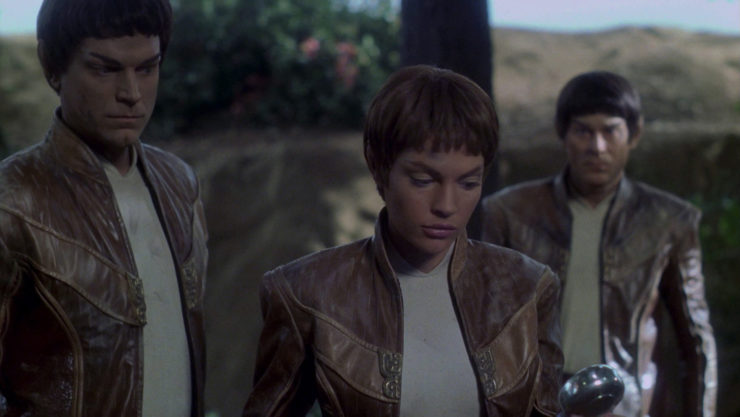“Carbon Creek”
Written by Rick Berman & Brannon Braga and Dan O’Shannon and Chris Black
Directed by James Contner
Season 2, Episode 2
Production episode 027
Original air date: September 25, 2002
Date: April 12, 2152
Captain’s star log. Archer, T’Pol, and Tucker are celebrating T’Pol’s one-year anniversary serving on Enterprise. The previous record for a Vulcan serving on a human ship was ten days. Archer also asks a question he’s been meaning to pose since noticing something in her service record: at one point during her assignment on Earth, she visited Carbon Creek, Pennsylvania.
T’Pol explains that it was the site of the first contact between humans and Vulcans, which she says happened, not in Bozeman in 2063, but in Carbon Creek in 1957.
She then tells the story of her great-grandmother, T’Mir, who was second-in-command on a survey vessel that was sent to observe Earth following the launch of Sputnik I. However, the ship had a malfunction, and was forced to crash-land. The captain is killed in the crash. They’re in a remote area in Pennsylvania, about six kilometers from a small mining town called Carbon Creek. While they transmitted a distress signal, they have no idea if it was actually sent, and if so, if it was received.
T’Mir and Stron would prefer to remain in hiding in the woods, but Mestral points out that they’ll starve to death before long. They go to Carbon Creek, steal some clothes, using hats and recombing of hair to hide their ears.
Upon realizing they will need local currency to purchase food, Mestral hits on the idea of hustling pool—it’s only geometry, after all—and he makes enough to get them some TV dinners.
Before too long, the three of them are renting a house. T’Mir is working at the bar where Mestral hustled pool, cleaning up the place. Stron is working as a handyman (using Vulcan tech for some of his repairs, making him very much in demand), while Mestral gets a job in the mines.
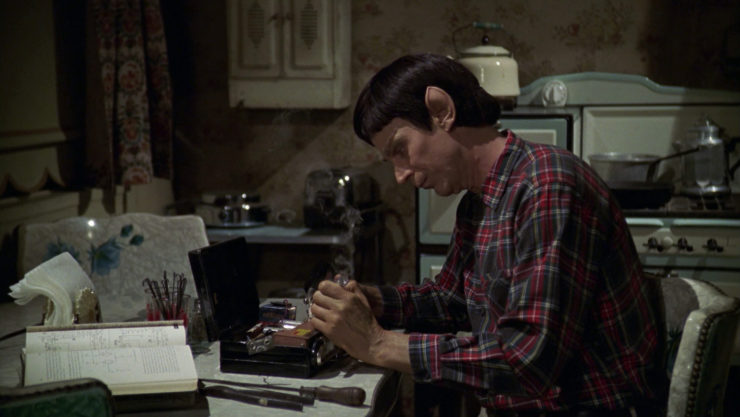
Mestral spends some time socially with Maggie, the owner of the bar. She’s a single mother, and her son Jack has received a partial scholarship to college. The town has been gathering up a collection to pay the rest of it. While T’Mir disapproves of Mestral’s friendship (and potential romance) with Maggie, she takes a liking to Jack, who is more eager for intellectual pursuits than most of the townsfolk.
When there’s an accident in the mines, Mestral insists on using their advanced technology to save lives. T’Mir and Stron object on the grounds that it’s interfering with humanity’s development, but Mestral points out that these people have become his friends, and he won’t leave them to die. T’Mir relents and helps him secretly rescue them, which most of the people in Carbon Creek chalk up to being some manner of miracle.
Six months after they crashed, a Vulcan vessel finally comes to their rescue, contacting them when they’re three days out. A Tellarite ship heard the distress call, and eventually forwarded it to High Command.
Word gets around quickly that the trio are leaving. Jack informs T’Mir that they haven’t collected enough for his tuition, so he’s going to remain in town, work, try to save money, and apply for the scholarship again. T’Mir decides to grab some Velcro from their crashed ship and sell it to a company in Pittsburgh for large sums of money, which she then leaves in the collection jar for Jack’s college fund.
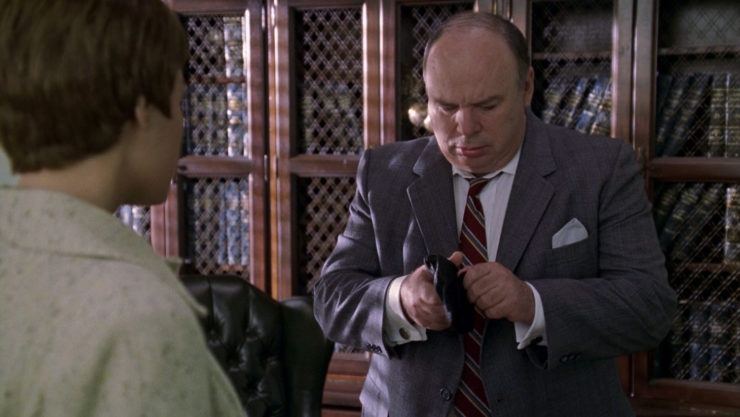
Mestral announces that he’s staying on Earth, as there’s so much more to learn. T’Mir and Stron both think this is a terrible idea, but eventually support him, informing the Vulcans who rescue them that he, like the captain, died in the crash.
Archer and Tucker are not entirely sure they believe the story, and T’Pol says only that they asked her to tell them a story, which casts doubt on the veracity of the entire tale. But then T’Pol retires to her quarters and takes out a keepsake: T’Mir’s purse that she used in Carbon Creek.
Buy the Book


The City Inside
Can’t we just reverse the polarity? The three Vulcans generally avoid using their fancy-shmancy technology while on Earth. The exceptions are Stron sometimes using it to aid in his repair work and Mestral using it to rescue miners. Why the latter gets him rebuked while the former is ignored is left as an exercise for the viewer.
The gazelle speech. Archer gets the whole schmear started when he asks T’Pol about her inexplicable choice of a small town in western Pennsylvania for a vacation spot while she was assigned to Earth.
I’ve been trained to tolerate offensive situations. T’Pol has fun trolling Archer and Tucker by being very cagey about whether or not the story she tells of T’Mir, Mestral, and Stron is even true.
Florida Man. Florida Man Has His World Rocked By Secret Vulcan Mission!
The Vulcan Science Directorate has determined… The Vulcans sent a survey vessel to observe Earth after they launched Sputnik I in 1957. Apparently they sent it out without performing a full maintenance check…
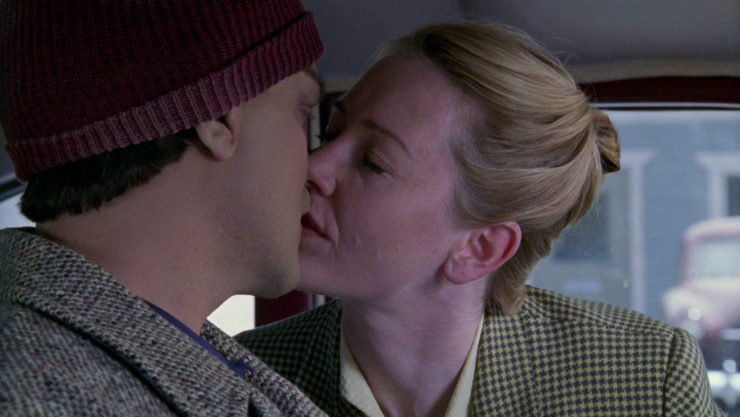
No sex, please, we’re Starfleet. Maggie mistakes an awkward silence brought about by Mestral’s difficulty understanding human body language cues for a romantic moment, and she leans in to kiss him. However, despite his surprise, he does not object to the kiss, either.
In addition, T’Mir changes clothes behind a white sheet, thus making sure to give the viewers a view of her silhouetted naked body.
I’ve got faith…
“I—I was simply surprised. It was—very pleasant.”
“’Pleasant’?”
“Wasn’t that an appropriate response?”
“Well, it’s been a while since I kissed a man, but still, I was hoping it’d be a little more than ‘pleasant’.”
“I did say ‘very pleasant’.”
–Mestral and Maggie discussing the latter’s impulsive kiss of the former.
Welcome aboard. J. Paul Boehmer plays his fourth of six roles on Trek as Mestral. Three of the other five, amusingly enough, are Nazis—in Voyager’s “The Killing Game” two-parter and upcoming on Enterprise in “Zero Hour” and “Storm Front.” He also played One in Voyager’s “Drone” and a Cardassian in DS9’s “Tacking Into the Wind.”
Michael Crawic plays his third of three roles on Trek as Stron. He previously was a founding Maquis in DS9’s “The Maquis, Part I” and a Caatati captain in Voyager’s “Day of Honor.”
David Selburg plays his fourth of four roles on Trek as the Vulcan captain. He played Whelan (in amusing serendipity, that character was an expert in twentieth-century history) in TNG’s “The Big Goodbye,” Syrus in TNG’s “Frame of Mind,” and Toscat in Voyager’s “Caretaker.”
Hank Harris plays Jack, Ann Cusack (sister of John and Joan) plays Maggie, and Jolene Blalock does double duty, playing both T’Pol as usual and the character’s ancestor T’Mir.
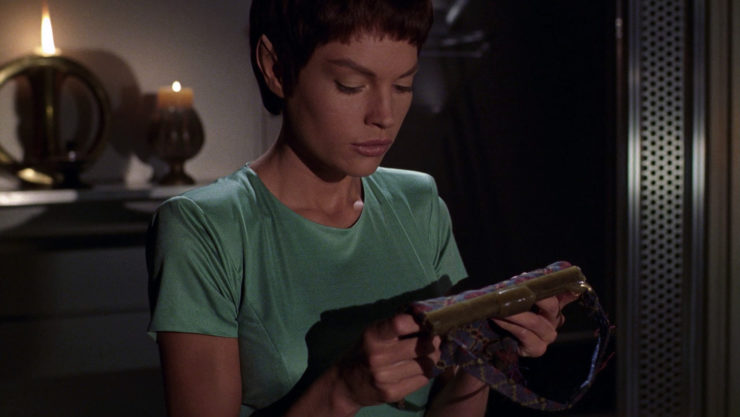
Trivial matters: This episode was filmed first in the season because of the extensive location shooting, but obviously had to be aired second, what with “Shockwave, Part II” having a cliffhanger to resolve…
Only three of the opening-credits regulars appear in this one: Scott Bakula, Jolene Blalock, and Connor Trinneer.
Velcro was invented by a Swiss electrical engineer named George de Mestral, who probably never set foot in Pennsylvania in his life, but is also the source of one of the Vulcans’ names. The name is a portmanteau of two French words, velours (for the soft part) and crochet (for the hooks). The patent was granted to de Mestral in 1955 in Switzerland, three years before T’Mir supposedly sold it in Pittsburgh.
Sputnik I was launched on the fourth of October 1957. The 1957 baseball season ended on the 29th of September, with the World Series ending on the tenth of October. The minor-league baseball season ended even earlier. The only possible baseball game that the denizens of Carbon Creek could’ve been listening to on the radio in October 1957 was the World Series between the Yankees and Braves, but neither team had anybody named Wilcox, Ellis, Thompson, or Dixon on their teams.
Frozen TV dinners in 1957 would have had meat in them. There is no explanation as to why the Vulcans, who are vegetarians (Stron and T’Mir roundly reject Mestral’s proposal that they eat a deer they encounter in the woods), eat them. (Maybe they just ate the side veggies and threw the meat out?)
In the original airing of the episode, and on the VHS release, the song playing when T’Mir and Mestral entered the bar was “Crazy Arms” by Ray Price. However, the DVD, Blu-Ray, and international versions, as well as the streaming one currently on Paramount+, instead have “Gently Falls” by Dave Colvin playing.
Mestral also appears in the novels From History’s Shadow and Elusive Salvation, both by Dayton Ward. Both novels involve several twentieth-century Trek characters from such episodes as “Tomorrow is Yesterday,” “Assignment: Earth,” “Little Green Men,” etc.
In the post-finale novel The Romulan War: To Brave the Storm by Michael A. Martin, Tucker and T’Pol are established as having a daughter, who is named T’Mir in tribute to the girl’s great-great-grandmother.
Tucker and Archer insist that first contact between humans and Vulcans was in Bozeman, Montana in 2063, as chronicled in the movie First Contact. Tucker mentions the commemorative statue of Zefram Cochrane on the site that La Forge mentioned in the movie.
Vulcans investigating Earth in the mid-twentieth century will be seen again in Picard’s “Mercy.”
Two TV shows are referenced that were important to Trek. Tucker mentions The Twilight Zone, one of Trek’s forebears in the world of science fiction television that challenged the viewer. Mestral mentions I Love Lucy, which starred Lucille Ball and Desi Arnaz, whose Desilu Productions produced Trek.
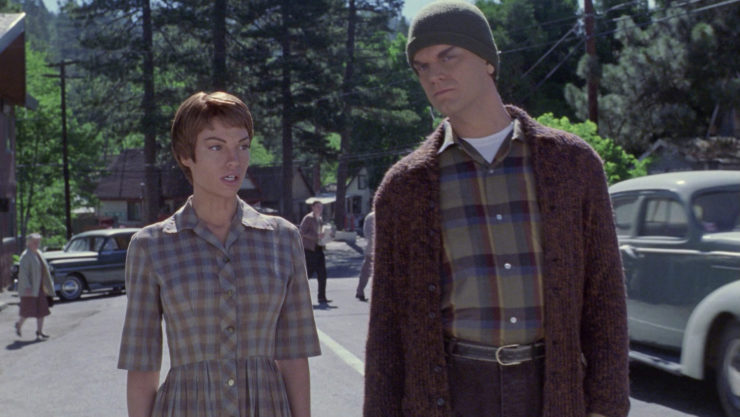
It’s been a long road… “I need to go now—I Love Lucy is on tonight.” Let me start by saying that this is a fun episode, an entertaining little diversion. It’s actually much more successful than the very-similarly-structured Voyager episode “11:59,” which also saw one of the opening-credits regulars playing her own ancestor on a pre-warp-drive Earth.
But there were several little things that bugged me because it just required a little bit of research, and none of the four people credited with writing this episode cared enough to even try. It starts with a baseball game on the radio in October 1957 which couldn’t possibly have happened, continues to the “invention” of Velcro by T’Mir, and concludes with Jack’s entire college odyssey. The middle part is especially frustrating because they did enough research to know that Velcro was invented by a guy named de Mestral, so they gave J. Paul Boehmer’s character that name to spackle it over, but they didn’t bother to do anything else to tie it to reality.
Especially because that entire aspect of the plot was wholly unnecessary, and it’s because the four people writing the episode were thinking in 2002 terms for a story they were writing that took place in 1957.
In 1957, an Ivy-League university’s tuition was $800 a semester. We don’t know what college Jack was going to, but if it was somewhere closer to home like Duqesne University or Penn State, then it would’ve been even less than that. College tuitions started going up in price in the late 1980s, skyrocketed in the 1990s, so in 2002, the plot with Jack would’ve made sense, as college was prohibitively expensive without major financial aid or student loans when the episode was written—but that was not the case in 1957.
Especially since the rent for the place T’Mir, Mestral, and Stron were living in would’ve been less than $100 a month. One week of Mestral’s pay—Pennsylvania coal miners in the 1950s made between $100 and $150 per week—would’ve covered a month’s rent, with plenty left over. Stron’s work as a plumber would’ve paid him about the same as Mestral, plus T’Mir’s lesser wages cleaning up the bar. They weren’t exactly big spenders, and indeed would have only spent what they absolutely needed for support. After six months in Carbon Creek, they would easily have had enough to pay for all of Jack’s tuition, even without the scholarship. So there was absolutely no need for T’Mir to “invent” Velcro (and apparently give her shipmate credit for it, probably because—and this is true to the time—the guys in Pittsburgh wouldn’t have believed a girl invented it).
It’s just frustrating because, these many many nitpicks notwithstanding, this really is a fun episode. Nothing earth-shattering, and it’s Yet Another Alien On Earth Before Official First Contact (latest in a series! collect ‘em all!), but Boehmer and Jolene Blalock do good work together. The former’s curiosity is very well-played—not inappropriately emotional, but simply logical by his own lights—and the latter does a fine job of showing T’Mir undergoing the same journey in an hour that T’Pol has been going on over the last year. Ann Cusack is fun as Maggie, and I especially like Hank Harris’ low-key Jack. Usually when you have someone that thirsty for knowledge portrayed onscreen, they’re overly enthusiastic and nerdy, but Jack is calmer about it, which makes it more likely that T’Mir would come to like him more than most of the other yucky humans. Honestly, the episode doesn’t need Stron at all, and I would’ve been happy to have removed him all together.
Still, it’s a fun episode. Just wish they’d done more than a modicum of research…
Warp factor rating: 7
Keith R.A. DeCandido has three short stories out in June: “A Lovely View,” a tale of Zorro in Zorro’s Exploits, edited by Audrey Parente, from Bold Venture Press; “What You Can Become Tomorrow,” a story that features author Mary Shelley, baseball player Josh Gibson, and NASA scientist Florence Johnson, in Three Time Travelers Walk Into…, edited by Michael A. Ventrella, from Fantastic Books; and “Smells Like Teen Spirit,” a Super City Cops story in Tales of Capes and Cowls, edited by C.T. Phipps, from Crossroad Press.










